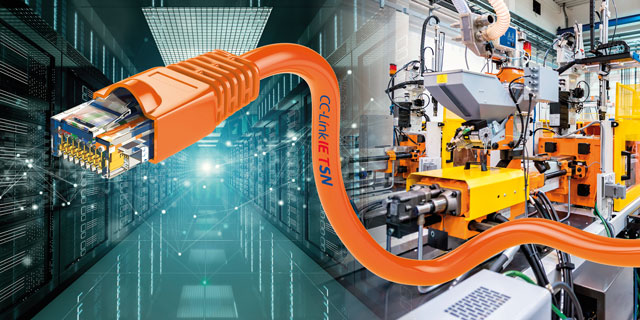

Jeremy Shinton, Product Manager for Edge Computing Technologies at Mitsubishi Electric, looks at how TSNcompatible automation components can create agile and futureproof factories.
There is a lot of hype about one of the most significant and transformational developments in standard Ethernet technology – Time-Sensitive Networking (TSN). This is an enabling technology for industrial communications that can help to realise IT/OT convergence and lead to substantial enterprise-wide improvements. In effect, TSN and TSN-compatible devices are key to setting up futureproof Industrial Internet of Things (IIoT) frameworks that enhance productivity, flexibility and responsiveness.
TSN is an innovative technology at Layer 2 (Data Link) of the Open System Interconnection (OSI) reference model for communications. Defined by the IEEE 802.1 standards, it provides key functions to make Ethernet deterministic by design. This enhances industrial communications technologies, helping to coordinate network traffic as the volume of data continues to increase with the convergence of IT/OT.
With TSN, all devices on a network are synchronised. This minimises the likelihood of jitter and prevents any subsequent delay in high-speed data transfer. In addition, TSN supports the prioritisation of urgent and regular data, by reserving timeslots for both. During these intervals, only scheduled or time-critical traffic is transmitted, without any interference. As a result, network overload can be prevented, minimising the risk of data loss.
In practice, these capabilities hold the key to creating futureproof IIoT applications. Providing accurate methods to prioritise the transmission of urgent or mission-critical information, such as control data from the shop floor, allows different types of traffic to be merged on the same TSN-compatible network. The result is flattened, simplified architectures with limited capital expenditure (CAPEX).
These architectures can also increase uptime by streamlining the identification and elimination of network errors. In addition to this, businesses can set up a more flexible infrastructure, where TSN compatible devices can be easily added, removed or reconfigured.
What built-in determinism offers
The convergence of IT and OT is at the core of future-oriented IIoT applications and the ability to transmit multiple information types and protocols, whilst maintaining low jitter and latency, is essential.
By creating a TSN-compatible, unified network of automation devices with TSN functionalities, IT and OT networks can be combined to operate over a converged Ethernet architecture. This, in turn, enables companies to benefit from the data driven knowledge generated by different parts of an enterprise as they obtain holistic actionable insights into manufacturing processes.
Furthermore, they can create decentralized decision-making strategies to help different parts of the company access relevant data from across the organisation to obtain key process information. Ultimately, the in-depth understanding that is generated can be leveraged to improve KPIs, leading to enhanced performance, productivity, efficiency and end product quality.
TSN offers an unprecedented opportunity for companies, enhancing industrial communications and providing the tools to realise forward-looking smart manufacturing strategies.
The implementation of TSN solutions in network technologies and automation devices is therefore essential to help businesses to succeed in their digital transformation strategies.
Businesses can adopt TSN-compatible devices now
Mitsubishi Electric recently released TSN interfaces across its automation systems product range, providing communications technology that combine gigabit Ethernet bandwidth with Time-Sensitive Networking, CC-Link IE TSN. These enable both machine builders and end users to make the switch to TSN or upgrade their current systems.
The range of products offered by Mitsubishi Electric includes PLCs, servo amplifiers, robots, HMIs, I/Os, variable speed drives and CNCs. By adopting Mitsubishi Electric components that incorporate CC-Link IE TSN, companies can rely on proven technologies that realise the full potential of Time-Sensitive networking to create agile and futureproof factories.

